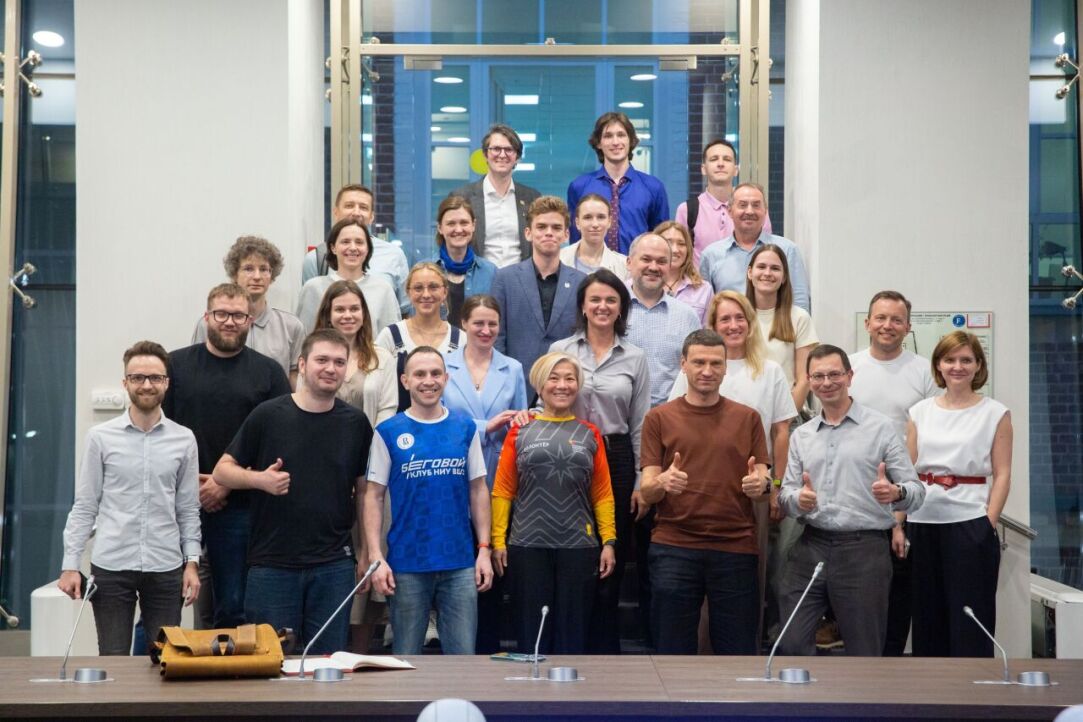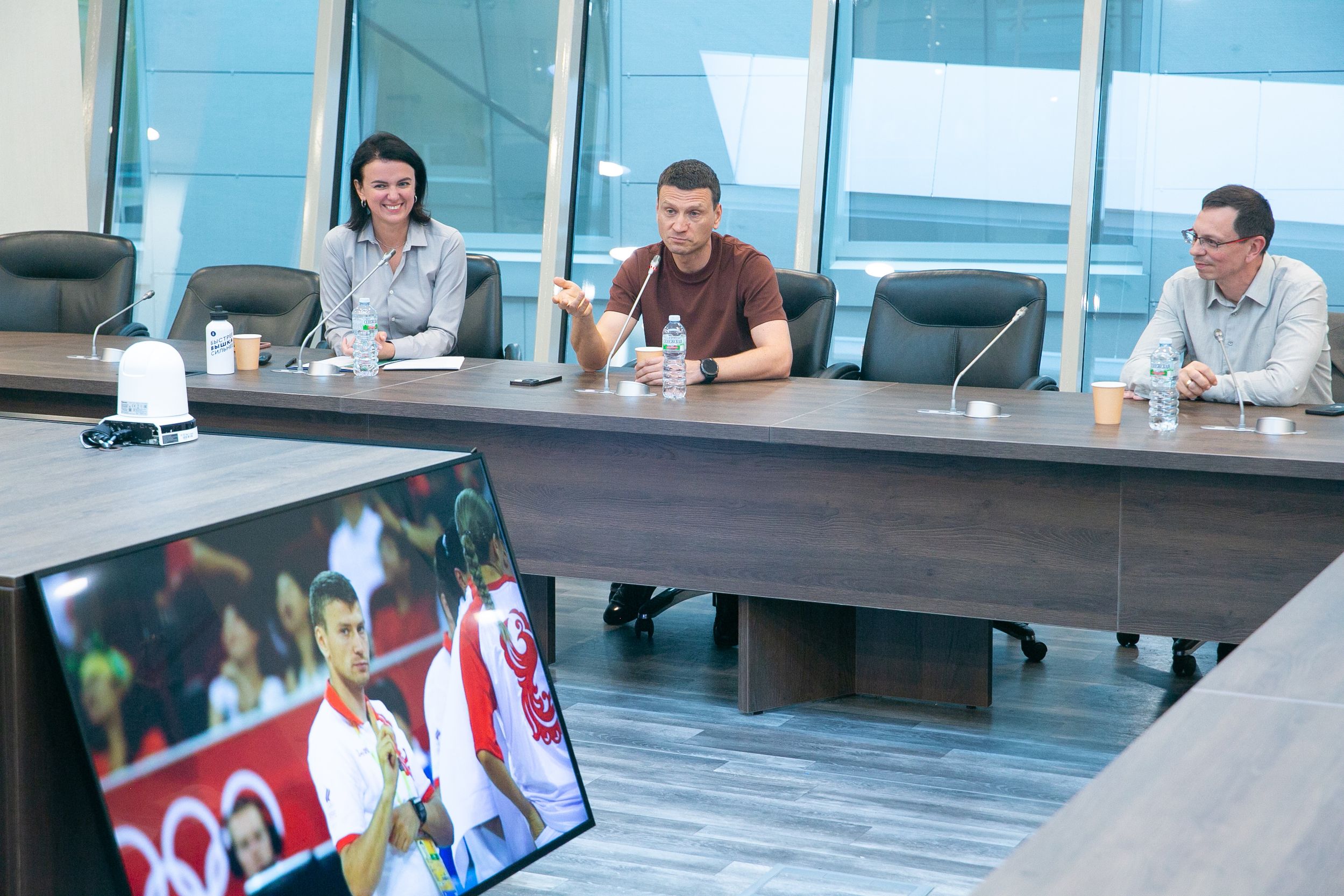‘Running Isn’t About the Distance—It’s About the Company’

On April 23, 2025, the university's Runners Club met with Dmitry Tarasov, Director of the Moscow Marathon and Running Community Co-founder, at HSE University at Pokrovsky Bulvar. Meeting participants discussed the launch of the running season, the development of the HSE sports community, as well as the community's plans for the next few years.
The meeting brought together people who are used to setting goals even outside their curriculum: HSE University Rector Nikita Anisimov, economists with half-marathon experience, lawyers dreaming of their first 10 km run, and even mathematicians eager to argue late into the night about the biomechanics of running. They spoke about first race preparation, why frequent injuries are more myth than reality, and why it is worth asking the Ministry of Health for a certificate.
It was ‘Dmitry [Tarasov] who reinstated Moscow as one of the running capitals in a global sport,’ Nikita Anisimov said. ‘The life of the running community is the life of a huge number of people, a giant organism,’ he added and stressed that this sport is changing both people and the ecosystem of megacities for the better.

Anna Kozyreva, Director of the Centre for Financial and Administrative Coordination of the HSE AI and Digital Science Institute, emphasised the university’s large scale and the importance of running as a unifying factor. ‘We have four campuses in different cities and regions of Russia, with very different people working and studying at each. Running can act as a linchpin for all of them,’ she added.
Dmitry Tarasov agreed, because people engaged in running become a more like a family, instead of just colleagues, ‘It's wonderful that we have an opportunity to work like a family, to grow and develop, to make sure that people don’t lose the drive to create something new.’
He announced to meeting participants key dates for the Russian Running Community. ‘Our schedule is always packed,’ he said, ‘a new project—a race along the Garden Ring—is planned for May 17. There will be four more races; one of them will take place close to Pokrovsky Bulvar. We are currently working on these events together with the city alongside the usual preparations for our main races.’
Anna Kozyreva drew guests’ attention to the fact that the space in front of the HSE building in Pokrovsky Bulvar, which used to be empty during Moscow marathons, came to life in 2024: the HSE fan zone, headed by Nikita Anisimov, supported the runners at the location for the first time.
The schedule of races in which the HSE Runners Club participates is available here.
One of the Running Community's key goals is to expand the number of participants and engage even more people in sports. ‘The more races we have, the bigger the audience,’ Dmitry Tarasov noted. The community’s audience grows by 25% annually. It is worth noting that the average participant’s age remains stable—35 years old. In order to attract young people to the community, athletics classes are arranged for students. The HSE Student Runners Club is a strong contender for one of the three top places in the Moscow Student Running Cup team rating.
‘When we created the community, we focused on runners, but then we started interacting with different social groups: students, volunteers, businesses, and an international audience. We realised that by focusing only on runners, we would limit our rapid growth,’ Dmitry Tarasov noted.
Businesspeople who have joined the Running Community help the marathon movement grow. ‘Last year, our business patrons allocated about 3 million rubles to the fund, which we invested in supporting Russian athletes,’ he added.
‘Our races, and the Running Community’s activities in general, have a positive impact on the country’s sports and economy. The amount of money and the number of jobs in the industry are increasing, along with the number of market players and the amount of taxes they pay. At the same time, we do not just organise events, we also help businesses develop in various fields. Thus, in the near future, we will launch a study on the economic impact of running on the HoReCa segment,’ Dmitry Tarasov informed.
According to HSE representatives, students and staff have been training with professional athletics coaches for a couple of years now, and inter-campus races are being considered. In 2025, the university also plans to arrange corporate team trips to participate in the Kazan Marathon and the White Nights Marathon in St. Petersburg for the first time.
A special project for graduates is also being discussed: there are plans to allow HSE alumni to become members of the Runners Club so that they remain part of the community even after graduation.
‘We are confident that such initiatives will help not only strengthen the running community, but also make it the hallmark of HSE,’ Anna Kozyreva said.
Short-term goals for the community:
20% of Moscow residents will start running regularly;
500 running clubs will operate in the capital;
up to 50,000 people will participate in the Moscow Marathon;
multi-format sports events for running enthusiasts will be organised and supported;
the active development of running infrastructure in the city will continue;
Moscow running culture will grow stronger.

